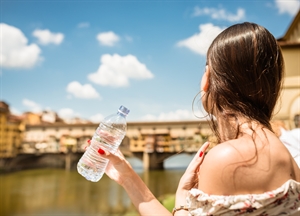If you can catch it from fresh water, it’s a water-borne disease. You can be exposed to disease-causing microorganisms while drinking, while washing or swimming or while preparing or eating food.
Some water-borne diseases are viral, including:
- hepatitis A
- hepatitis E
- polio
Other water-borne diseases are caused by bacteria. These include:
- campylobacteria
- cholera
- Salmonella poisoning and typhoid
And other diseases are the result of parasites, such as cryptosporidiosis, schistosomiasis and giardia.
Some of these infections – for example, typhoid and cholera – are potentially fatal and others can take a long time to clear up, or have treatments with unpleasant side effects. Fortunately, there are a few simple steps to reduce your chances of getting sick.
1. Learn about safe water
In the UK we are very lucky to have tap water of a high standard. However, in many regions, tap water needs to be treated before it is safe to drink. To check the standards of tap water at your destination, visit Is the Water Safe to Drink – but you should ask your travel health adviser for the most up to date information.
2. Plan how you will source safe water
If you know the water isn’t safe to drink at your destination, you should consider how you will get hold of drinking water. Bring your own water bottle so that you can carry drinking water with you wherever you go.
Water in factory-sealed bottles is generally fine to drink – but plastic bottles are a major source of litter, so dispose of your empties carefully.
Purification can be appealing, particularly if you are heading into remote areas. There are several methods:
- boiling
- halogens
- salt electrolysis
- filtration
- UV radiation.
To learn more about these water purification techniques and the equipment you will need for each visit NHS Fit for Travel. Gear for making water safe can be picked up from camping shops and you can buy water sterilisation tablets from a pharmacy.
3. Dental care
Remember that you will need to use safe water for teeth cleaning, and you should keep your mouth shut while showering.
4. Ice is not a good idea
Freezing does not kill microorganisms, so there could potentially be water-borne pathogens in ice cubes. Unless you know that the ice at the bar was made with bottled or purified water, it’s best to enjoy your drink at room temperature. Bottled drinks that have been chilled in the fridge are, of course, fine
5. Where are you swimming?
Remember that you can be exposed to parasites, viruses and bacteria while swimming. Giardia and schistosomiasis are just two illnesses that are linked to freshwater bathing. Get local advice about where to swim and respect ‘no swimming signs’. And when you do find a safe spot to swim, try to avoid inhaling or swallowing water.
6. Get the shots
It is tempting to think that you can escape from these diseases by avoiding exposure to contaminated water – but this is harder than it sounds! For complete peace of mind, and the highest level of protection, you need travel vaccines for overseas travel. These shots include immunisations against some of the most common water-borne illnesses. Ask your travel health adviser about the shots against typhoid, hepatitis A, cholera and polio.


Book Online